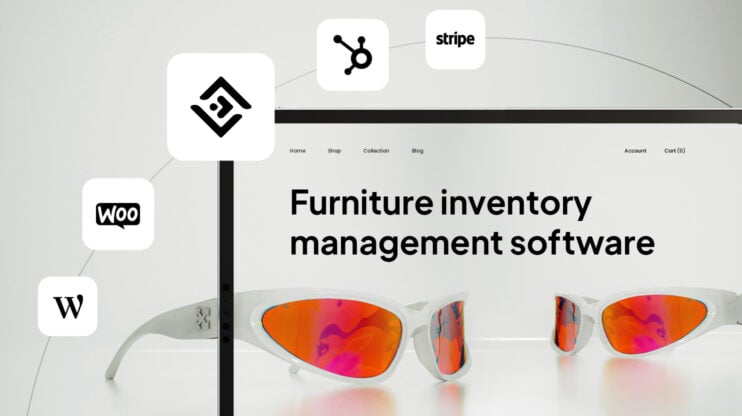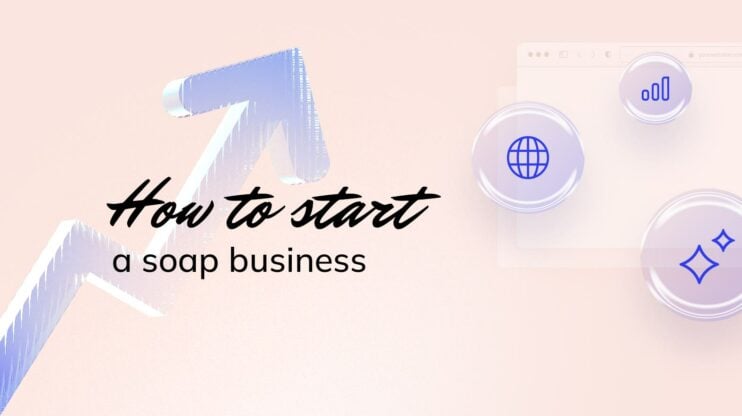CRM, or customer relationship management, is how businesses keep track of every interaction with their customers—from the first friendly hello to building solid, long-term loyalty. It’s like the ultimate playbook for making sure customers feel valued and keep coming back, which is key to driving profits and staying successful. I actually have a friend who runs a small online store and he swears by his CRM software—it helped him track customer preferences and automate follow-ups, which boosted his sales like crazy.
In this article, I’ll break down what CRM really means, why it’s important for ecommerce, and how it can give your business a competitive edge. On top of that, I’ll walk you through 9 top CRM tools for ecommerce businesses that combine smart automation with a personal touch. Let’s dive in!

Create your online store in minutes!
Looking to sell online? Develop and launch your store with 10Web AI Ecommerce Website Builder.
What is a CRM tool?
Customer relationship management (CRM) tools are designed to make handling customer data easier. They bring together key details like shopping habits, contact information, purchase history, and more, all in one centralized and accessible location. This creates a clear, organized view of your customers and their interactions with your business.
CRM is a powerful tool for building strong customer relationships. It helps you connect with your audience, build loyalty, and keep them coming back. With everything streamlined in one place, businesses can seamlessly track sales, stay on top of leads, and gain a deeper understanding of customer behavior. These valuable insights help ecommerce businesses make smarter decisions, strengthen customer relationships, and improve business performance.
Real-world impact of CRM on ecommerce
On the Talk’n Shopify with Zyber – eCommerce podcast, the host noted a growing trend: more “ecommerce merchants are using [CRM] now and there’s a trend that [they] have been seeing.” It’s not just about following trends—CRMs give ecommerce businesses a clear, all-in-one view of customer interactions. And when your customers come from all over, having that big-picture insight helps you create smarter marketing strategies and deliver the kind of personalized service that keeps people coming back.
The numbers don’t lie either. According to DemandSage, companies using CRM tools saw a 17% increase in lead conversions, a 16% boost in customer retention, and a 21% jump in productivity. Those kinds of results show that CRM isn’t just another tool; it’s a serious upgrade for businesses that want to build stronger connections and drive growth.
Key features of CRM for ecommerce
CRMs are powerful tools that bring structure and efficiency to ecommerce businesses, packed with features that make your life easier. Here’s a closer look at what they bring to the table:
- Customer data management: CRMs centralize customer information like contact details, purchase history, and preferences. With everything in one place, businesses can easily personalize their interactions and create stronger connections.
- Segmentation: With segmentation you can group customers by behavior or demographics. This feature allows you to create campaigns that are tailored and more impactful.
- Sales automation: Automating tasks like order processing and inventory management allows CRMs to save time and improve accuracy. It’s a practical way to increase efficiency without adding more workload.
- Customer service integration: Bringing tools like live chat and email support into one system helps businesses respond faster to customers, guaranteeing smoother communication and better service experiences.
- Analytics and reporting: CRMs offer valuable insights into customer behavior and sales trends. This data helps businesses make informed, strategic decisions for future growth.
- Marketing automation: By managing email and social media campaigns, CRMs make sure that customers receive relevant messages at the right time. It’s a simple way to keep your marketing efforts on track.
- Loyalty program management: Tracking rewards and personalizing offers is much easier with a CRM. It simplifies loyalty programs and helps maintain strong relationships with returning customers.
- Multi-channel management: A good CRM connects all platforms—website, app, or social media—creating a seamless experience for customers regardless of how they interact with your business.
With these features, a CRM tool is the dependable partner that keeps your ecommerce business running smoothly, impressing customers, and driving growth behind the scenes.

Create your online store in minutes!
Looking to sell online? Develop and launch your store with 10Web AI Ecommerce Website Builder.
9 best CRM for ecommerce stores
The right CRM tool is an important choice—it helps you streamline processes and build better customer relationships. A colleague of mine who’s been in ecommerce for years shared how they went through trial and error before finding a CRM that actually made a difference. Their advice? Focus on the CRMs that align with your business needs and can easily integrate with the tools you already use.
To make life a little easier, I’ve put together a list of the top 9 CRM for ecommerce businesses. I’ll break down their standout features, along with the pros and cons of each, so you can decide which one fits your business best. Let’s dive in!
1. HubSpot CRM
HubSpot CRM is a favorite for ecommerce businesses, and it’s easy to see why—it integrates seamlessly with online store setups and is super beginner-friendly. When I signed up, all it took was sharing basic details like my name, email, and company info. The platform then walked me through with helpful tutorials that made it simple to get started.
One of HubSpot’s standout features is its data synchronization, which keeps inventory tracking smooth and effortless. Plus, its centralized customer service system lets businesses respond faster, keeping customers happy. There are tons of guides available online, and one even helped me as a total newbie!
Here’s a fun fact: Casio saw a 27% jump in ecommerce customers after using HubSpot for just a year. So, if you’re serious about growing your business without added headaches, HubSpot CRM is definitely worth checking out.
| Pros | Cons |
| Free basic plan available | Advanced features can be expensive |
| Easy-to-use interface | Some users find the reporting limited |
| Good integration with ecommerce platforms | Can be complex for very small businesses |

Create your online store in minutes!
Looking to sell online? Develop and launch your store with 10Web AI Ecommerce Website Builder.
2. Pipedrive
Pipedrive is a fantastic option for ecommerce businesses, and honestly, it’s pretty straightforward to get started. The sign-up process for me was quick, and the free trial didn’t even ask for a credit card—which is always a win. If you’re new, there’s a beginner’s tutorial that walks you through the basics, so you’re never left guessing.
What really makes Pipedrive stand out is its visual sales pipeline. Let’s face it, sales processes can feel chaotic, but Pipedrive breaks it down into a clear, easy-to-understand format that keeps everything on track.
Another handy feature is the product catalog. It links inventory management and sales tracking seamlessly, so you’re not stuck switching back and forth between tools.
| Pros | Cons |
| Easy-to-use interface | Limited customization options |
| Strong sales pipeline features | May lack some advanced ecommerce features |
| Good for visual sales tracking | Can be pricey for smaller teams |
3. Zoho CRM
When I signed up for Zoho CRM, it immediately felt user-friendly, with a straightforward process and easy navigation. Its unified business view is a real game-changer—it brings everything together like orders, inventory, and customer interactions to help ecommerce businesses run more efficiently.
It syncs smoothly with Shopify, WooCommerce, and other major platforms, so all your data—orders, inventory updates, customer interactions—stays up-to-date in one place. On top of that, its automation features are lifesavers, handling repetitive tasks like follow-ups and data updates for you. This means you can spend less time on the boring stuff and focus on what’s really important.
That said, integrating Zoho with other apps isn’t always a walk in the park and might need a bit of technical know-how. Thankfully, their guide was super helpful and made the process much smoother for me.
| Pros | Cons |
| Affordable pricing | Learning curve for new users |
| Built-in inventory management | Some advanced features cost extra |
| Good integration options | Mobile app could be improved |
4. Salesforce Commerce Cloud
If you’re looking to grow your business, Salesforce Commerce Cloud is a tool you should definitely check out—especially since they offer a 30-day free trial. That’s plenty of time to explore and see if it’s the right fit. When I tried it, the interface was super simple and easy to navigate, so no headaches there.
While it’s similar to Zoho CRM in unifying your ecommerce needs, Salesforce takes things up a notch. It’s packed with tools built for online retail, like customer behavior analytics, AI-driven personalization, and merchandising features.
The real standout, though, is Einstein AI. It personalizes the shopping experience by recommending products based on what customers browse or buy. Icebreaker, a merino wool brand, used it and saw a 28% boost in revenue and an 11% jump in average order value.
| Pros | Cons |
| Easy to use | Can be expensive |
| Connects with other Salesforce tools | May be too complex for small businesses |
| Strong customer support | Requires technical skills to set up |
5. Klaviyo
When I set up my account on Klaviyo, the process was surprisingly quick—it only took me a few minutes to get started. Klaviyo truly stands out for its automation capabilities, which can significantly improve your daily operations.
For example, it handles automated email flows like welcome messages and abandoned cart reminders effortlessly. The best part? It doesn’t just use standard templates. Instead, it creates emails tailored to each customer based on their actions. InfoShare Academy tried this and gained 1,200 new contacts in just one month at a low cost. That’s impressive.
I also found Klaviyo’s analytics really useful. The dashboard shows everything from open rates to deeper insights like customer lifetime value and revenue, which gives you a clear picture of how your marketing campaigns are performing.
| Pros | Cons |
| Easy to use with ecommerce platforms | Can be pricey for larger lists |
| Strong email and SMS features | Learning curve for new users |
| Good data tracking | Limited features on free plan |

Create your online store in minutes!
Looking to sell online? Develop and launch your store with 10Web AI Ecommerce Website Builder.
6. NetSuite
If your business is growing and you’re dealing with disconnected systems, NetSuite could be a great solution. This CRM tool simplifies the entire sales process—from capturing leads to fulfilling orders—so everything runs more smoothly. Like some of the other tools we’ve talked about, NetSuite takes a unified approach to managing your data, which helps keep everything in one place.
That said, one drawback I noticed is the cost—it might be on the higher side for some businesses compared to similar tools.
A great example of its impact is Universal Audio. After adopting NetSuite, their team saved 8-10 hours per month by automating tasks they previously handled manually. That’s a lot of extra time they could put toward other priorities. If you’re looking for a way to streamline and save time, it’s worth considering!
| Pros | Cons |
| Integrates with other Netsuite tools | Can be complex for small businesses |
| Good for growing companies | Might be pricey for some users |
| Offers advanced features | Requires time to learn all functions |
7. ActiveCampaign for Ecommerce
ActiveCampaign integrates smoothly with platforms like Shopify, WooCommerce, and BigCommerce. This means your store and marketing systems just… click. It’s one of those things you don’t think about until scaling becomes a problem, but this setup makes it effortless.
Then there’s the automation—seriously impressive. It sends personalized messages based on what your customers do, which means more revenue and higher profits without the extra effort.
It tracks customer lifecycles too! Unlike most CRMs, this one shows how your marketing efforts are driving revenue. You’ll know exactly what’s working, so you can adjust like a pro.
If you’re ready to try it, this video makes setting up your account a breeze!
| Pros | Cons |
| Advanced email & SMS automation | Overwhelming for beginners |
| Seamless ecommerce platform integrations | Pricing increases with more contacts |
| Powerful segmentation for targeted marketing | Requires some setup time for advanced workflows |
8. Drip
Drip is famous for its powerful behavioral segmentation. Basically, it helps you automatically group customers based on what they’ve purchased or their overall shopping habits. This feature alone can seriously level up your marketing strategies.
Another standout? Like ActiveCampaign, Drip connects your campaigns to the revenue they bring in. It doesn’t just stop at tracking opens and clicks—it shows exactly how each email, SMS, or automation workflow is impacting your sales. You’ll see the real dollars behind your efforts, which is a total game-changer.
Want proof it works? Look at Nifty Gifts. Just two months after switching to Drip, they saw a 77% boost in revenue. You can dive into their full success story here.
| Pros | Cons |
| Advanced ecommerce-specific automation | Pricing can add up with large email lists |
| Seamless integration with Shopify, WooCommerce, Magento | Slight learning curve for advanced workflows |
| Revenue tracking for campaign performance | Lacks built-in customer support tools |
9. Ometria
Ometria brings customer data and marketing together, all powered by AI. Think of it as having a super-smart assistant that handles both data and marketing for you.
The downside? No free trial, so I couldn’t test it myself. But if you use Ometria, its predictive analytics can spot patterns in customer behavior and even forecast what they’ll do next –as this is what happened in Sephora’s case. It’s also great at spotting when customers might lose interest or stop buying from you. Once you’re informed, you can send personalized messages to win them back.
What’s cool is that Ometria’s AI keeps learning from customer interactions, so its predictions and recommendations get smarter over time. It’s like having a tool that evolves with your business!
| Pros | Cons |
| AI-driven customer analytics & segmentation | Premium pricing |
| Multi-channel marketing automation | Requires some data integration setup |
| Predictive modeling for customer retention | Not ideal for businesses without existing customer data |
Conclusion
Choosing the right CRM can really transform your ecommerce business. It all comes down to three big factors:
- Managing customer data
- Smooth integrations
- Automation that grows with your business
The key is finding a platform that fits your goals and turns all that raw data into insights you can actually use. This helps you organize your data, foster better customer relationships, and increase profits.
FAQ
Which CRM integrates best with Shopify?
Are there free CRM options for online stores?
What's the top CRM for beginners?
How does Salesforce compare to others?
Is Zoho CRM good for small businesses?
Which CRM offers the best customer support?
Can HubSpot handle large ecommerce operations?
What features should I look for?

Create your online store in minutes!
Looking to sell online? Develop and launch your store with 10Web AI Ecommerce Website Builder.












